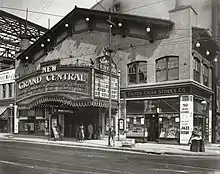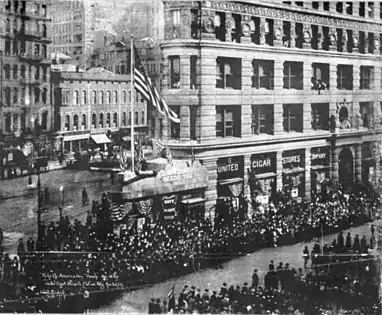United Cigar Stores
United Cigar Stores was a chain of cigar stores in the United States that in its first quarter-century grew to nearly 3,000 shops. It eventually became part of the corporation that bought Marvel Comics and its parent company Magazine Management from their founder in 1968.


History
Brothers Charles A. Whelan and George J. Whelan founded a tobacco wholesale firm in Syracuse, New York, in 1901, eventually turning to retail. By 1926, the chain had nearly 3,000 stores.[1] Though initially specializing in cigars, it eventually sold many other items, such as Mickey Mouse watches and shoe trees.[2] The chain represented the interests of the Consolidated Tobacco Company, the tobacco trust that controlled the American Tobacco Company and others. In September 1903 a settlement was reached with the chain's competitors and all competition ended.[3]
In August 1929, the chain and the affiliated Whelan Drug chain, founded by two of Charles' Whelan's sons, was sold to brothers George Kenan and Frederick Kenan Morrow.[4][5] The company also was involved in real estate. As the Great Depression deepened, the real-estate subsidiary accumulated huge losses, so in September 1932 the holding company declared bankruptcy. Before its bankruptcy, it had 975 cigar stores and 219 drug stores, but most of its assets were in real estate.[6] The chain recovered and had 1300 outlets in 1951.[7]
Corporate progression
United Cigar Stores became part of United Cigar-Whelan Stores Corp., then United Whelan Corp.[8] In 1962, it and three other companies merged to form Perfect Film & Chemical Corp., a film-processing and mail-order seller of drugs and vitamins.[8][9] In 1968, it bought out publisher Martin Goodman, founder and owner of Magazine Management Company, the parent of Marvel Comics and other ventures.[8] The Company renamed itself Cadence Industries Corporation in 1970,[10] and was liquidated in 1986, selling its Marvel Entertainment Group to New World Pictures.[11]
References
- "Salesmen". Time. December 20, 1926. Archived from the original on May 22, 2018.
- "Business: Schulte & Specialties". Time. November 29, 1937. Archived from the original on October 25, 2016.
- Moody, John (1904). "Consolidated Tobacco Company and affiliated corporations. 'The Tobacco Trust.'". The Truth About The Trusts: A Description and Analysis of the American Trust Movement. New York: Moody Publishing. pp. 69–96ff. OCLC 1832950.
- "Milestones, Dec. 22, 1941". Time. December 22, 1941. Archived from the original on May 22, 2018. Retrieved January 1, 2008.
Died. Charles A. Whelan, 78, co-founder (with his brother) in 1901 of United Cigar Stores Co. of America which he sold in 1929 along with the Whelan Drug chain (founded by two of his sons)
- "Two Morrows". Time. September 2, 1929. Archived from the original on May 22, 2018. Retrieved March 14, 2007.
- "Business: Cigar Stores". Time. September 5, 1932. Archived from the original on May 22, 2018. Retrieved March 14, 2007.
- "Corporations: Battle for United Cigar". Time. October 15, 1951. Archived from the original on May 22, 2018. Retrieved March 14, 2007.
- Nadel, Nick (August 31, 2009). "The Strange Business History of Marvel Comics". Comics Alliance. Archived from the original on 19 March 2012. Retrieved 4 May 2011.
- "Magazines" New Man for Curtis". Time. May 3, 1968. Archived from the original on May 22, 2018. Retrieved August 6, 2011.
- "Cadence Industries Corporation Entity Information (DOS ID #: 33485)". New York State Department of State, Division of Corporations. Retrieved July 24, 2017.
- Hicks, Jonathan (November 8, 1988). "The Media Business; Marvel Comic Book Unit Being Sold for $82. 5 Million". The New York Times. Retrieved May 5, 2011.
Further reading
| Wikimedia Commons has media related to United Cigar Stores Co.. |
- Walter S. Hayward; Percival White; John S. Fleek; H. Mac Intyre. Chain Stores: Their Management and Operation. New York: McGraw-Hill; 1922. OCLC 255149441.